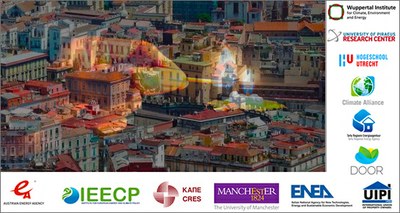Energy: Tackling energy poverty in the EU private rented sector
12/11/2020
 Brussels - Around 50 million households in the European Union are estimated to be living in energy poverty – or energy vulnerability, unable to afford the energy needed to adequately heat or cool their homes. This is caused by a combination of factors including high energy costs, low household incomes and energy inefficient buildings, and can have severe impacts on health and wellbeing.
Brussels - Around 50 million households in the European Union are estimated to be living in energy poverty – or energy vulnerability, unable to afford the energy needed to adequately heat or cool their homes. This is caused by a combination of factors including high energy costs, low household incomes and energy inefficient buildings, and can have severe impacts on health and wellbeing.
Energy poverty is recognised as a priority issue under the European Green Deal and the Clean Energy Package.
To tackle the issue, the EU objectives are to collect better data on space cooling and summer overheating, the incorporation of gender, housing and regional differences in energy poverty measurement and on policies, in order to evaluate best practices at the local level. “We want everyone in Europe to have a home they can light, heat, or cool without breaking the bank or breaking the planet,” said EU Executive Vice-President for the European Green Deal, Frans Timmermans, in the Renovation Wave Strategy presentation.
With the attention to support such objectives, key projects have been selected and will be funded under the Horizon2020 programme, including the 36-month ENPOR, a project specifically devoted to alleviating energy poverty in the European Private Rented Sector (PRS). Its aims are to identify energy poor tenants, and respective landlords, as well as understand and address their needs. This will be accomplished through the adaptation and implementation of ten policies in seven Member States.
Within this context, the ENPOR project proposes to investigate in a constructive manner how to tackle energy poverty in the PRS and to examine energy poverty policies for the PRS across the EU, building upon what is already being done. By monitoring the real dimensions of energy poverty in the PRS, its consortium aims to support new policies and to provide guidelines for other countries implicated in the matter. A key result will also be the development of an Energy Poverty Dashboard, a digital mapping tool and a platform for knowledge exchange within and between different national contexts.
Coordinated by the Institute for European Energy and Climate Policy in The Netherlands, and financed under the EU Horizon 2020 Programme, the project will take place until August 2023.
For more information on the project and cases, visit http://www.ieecp.org/project/enpor-actions-to-mitigate-energy-poverty-in-the-private-rented-sector/ and contact us.
PRESS CONTACTS
Marine FABER PERRIO, IEEC marine@ieecp.org and Belen Gutierrez, UIPI gutierrez@uipi.com
About ENPOR
Energy poverty levels remain high in the EU Member States due to increasing energy costs and slow progress on energy efficiency improvements. Despite various policies in place that directly or indirectly mitigate energy poverty at the household level, energy poverty is increasing in the private rented sector (PRS). The PRS presents quite specific issues that cannot be dealt adequately in the framework of energy poverty linked directly to energy efficiency, such as:
- difficulty to identify and quantify energy-poor households in the PRS; and
- the delivery of energy efficiency measures to these households is difficult due to structural problems like information deficits, split incentives and others.
ENPOR therefore aims at overcoming both challenges – making energy poverty in the PRS visible and as far as possible quantifiable, also testing energy efficiency support schemes to address it. This can increase the effectiveness of policies at a local or regional level: an alignment with structural measures is needed. Dedicated actions should actively contribute to alleviating energy poverty in the PRS by identifying energy-poor tenants (and respective homeowners) as well as understanding and addressing their needs. To this end, ENPOR will support the adaption and implementation of ten policies in 7 Member States tailored to the specific needs of the PRS and will integrate them into broader policy objectives. ENPOR will examine in depth energy poverty policies for the PRS across the EU, monitor the dimensions of energy poverty in the PRS, support tailored policies and will provide guidelines for other countries.
The project has received funding from the European Union’s Horizon 2020 research and innovation programme under grant agreement No 889385.
